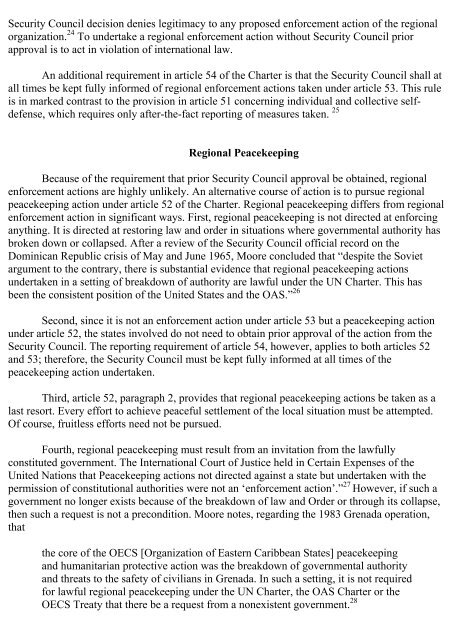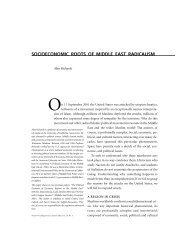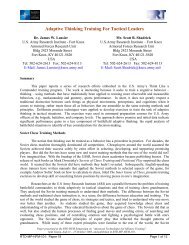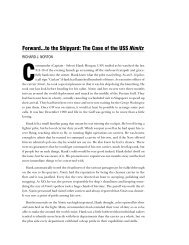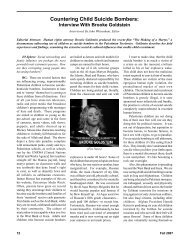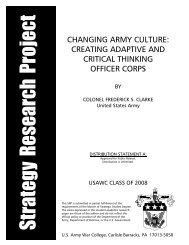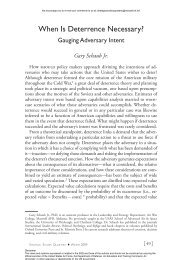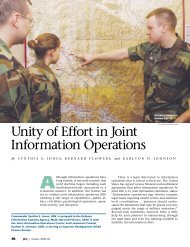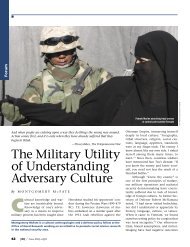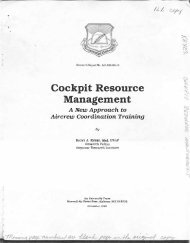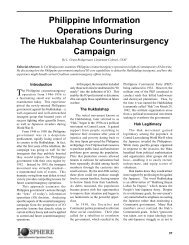Legitimate use of military force against state-sponsored - Air University
Legitimate use of military force against state-sponsored - Air University
Legitimate use of military force against state-sponsored - Air University
Create successful ePaper yourself
Turn your PDF publications into a flip-book with our unique Google optimized e-Paper software.
Security Council decision denies legitimacy to any proposed en<strong>force</strong>ment action <strong>of</strong> the regional<br />
organization. 24 To undertake a regional en<strong>force</strong>ment action without Security Council prior<br />
approval is to act in violation <strong>of</strong> international law.<br />
An additional requirement in article 54 <strong>of</strong> the Charter is that the Security Council shall at<br />
all times be kept fully informed <strong>of</strong> regional en<strong>force</strong>ment actions taken under article 53. This rule<br />
is in marked contrast to the provision in article 51 concerning individual and collective selfdefense,<br />
which requires only after-the-fact reporting <strong>of</strong> measures taken. 25<br />
Regional Peacekeeping<br />
Beca<strong>use</strong> <strong>of</strong> the requirement that prior Security Council approval be obtained, regional<br />
en<strong>force</strong>ment actions are highly unlikely. An alternative course <strong>of</strong> action is to pursue regional<br />
peacekeeping action under article 52 <strong>of</strong> the Charter. Regional peacekeeping differs from regional<br />
en<strong>force</strong>ment action in significant ways. First, regional peacekeeping is not directed at enforcing<br />
anything. It is directed at restoring law and order in situations where governmental authority has<br />
broken down or collapsed. After a review <strong>of</strong> the Security Council <strong>of</strong>ficial record on the<br />
Dominican Republic crisis <strong>of</strong> May and June 1965, Moore concluded that “despite the Soviet<br />
argument to the contrary, there is substantial evidence that regional peacekeeping actions<br />
undertaken in a setting <strong>of</strong> breakdown <strong>of</strong> authority are lawful under the UN Charter. This has<br />
been the consistent position <strong>of</strong> the United States and the OAS.” 26<br />
Second, since it is not an en<strong>force</strong>ment action under article 53 but a peacekeeping action<br />
under article 52, the <strong>state</strong>s involved do not need to obtain prior approval <strong>of</strong> the action from the<br />
Security Council. The reporting requirement <strong>of</strong> article 54, however, applies to both articles 52<br />
and 53; therefore, the Security Council must be kept fully informed at all times <strong>of</strong> the<br />
peacekeeping action undertaken.<br />
Third, article 52, paragraph 2, provides that regional peacekeeping actions be taken as a<br />
last resort. Every effort to achieve peaceful settlement <strong>of</strong> the local situation must be attempted.<br />
Of course, fruitless efforts need not be pursued.<br />
Fourth, regional peacekeeping must result from an invitation from the lawfully<br />
constituted government. The International Court <strong>of</strong> Justice held in Certain Expenses <strong>of</strong> the<br />
United Nations that Peacekeeping actions not directed <strong>against</strong> a <strong>state</strong> but undertaken with the<br />
permission <strong>of</strong> constitutional authorities were not an ‘en<strong>force</strong>ment action’.” 27 However, if such a<br />
government no longer exists beca<strong>use</strong> <strong>of</strong> the breakdown <strong>of</strong> law and Order or through its collapse,<br />
then such a request is not a precondition. Moore notes, regarding the 1983 Grenada operation,<br />
that<br />
the core <strong>of</strong> the OECS [Organization <strong>of</strong> Eastern Caribbean States] peacekeeping<br />
and humanitarian protective action was the breakdown <strong>of</strong> governmental authority<br />
and threats to the safety <strong>of</strong> civilians in Grenada. In such a setting, it is not required<br />
for lawful regional peacekeeping under the UN Charter, the OAS Charter or the<br />
OECS Treaty that there be a request from a nonexistent government. 28


